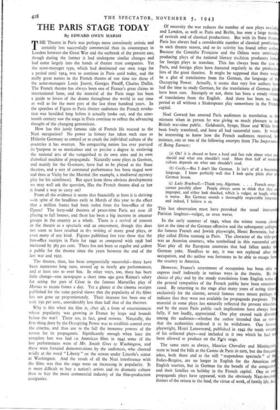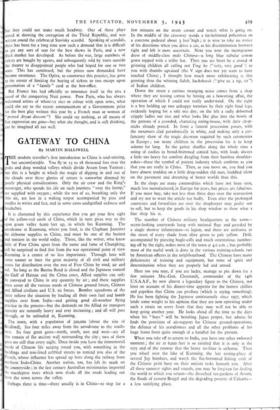THE PARIS STAGE TODAY
By EDWARD OWEN MARSH
THE Theatre in Paris was perhaps more consciously artistic and certainly less successfully commercial than its counterpart in London between the Great War and the outbreak of the present one, though during the former it had undergone similar changes and had come largely into the hands of theatre trust companies. Yet the actor-manager type, which had dominated our own stage for a period until 1914, was to continue in Paris until today, and the
really great names in the French theatre of our time are those of the actor-managers Louis Jouvet, Georges Pitoeff, Charles Dullin. The French theatre has always been one of France's great claims to international fame, and the material of the Paris stage has been a guide to lovers of the drama throughout the world in our time as well as for the most part of the last three hundred years. In the speeches of Figaro to Paris theatre audiences the French revolu- tion was heralded long before it actually broke out, and the nine- teenth century saw the stage in Paris continue to reflect the advancing thought of the changing generations.
How has this justly famous side of French life reacted to the Nazi occupation? No power in history has taken such care as Hitlerite Germany to control or to crush the individual culture of the countries it has overrun. No conquering nation has ever pursued its 'purpose to so meticulous and so precise a degree in enslaving the national arts of the vanquished to its own aims and its own diabolical machine of propaganda. Naturally some plays in German, and mainly for the Germans, have had to be played at the State theatres, and a sort of command performance has been staged now and then at Vichy for the Marshal (for example, a mediaeval mystery play for his saintliness). But apart from these obvious developments we may well ask the question, Has the French theatre died or has it found a way to carry on?
From all the evidence it seems that financially at least it is thriving —in spite of the headlines early in March of this year to the effect that a million francs had been stolen from the box-office of the Opera! The forty-odd theatres of peace-time Paris are now all playing to full houses, and there has been a big increase in amateur groups in the country as a whole. There is a revival of interest in the theatre as a spectacle and an amusement, though this does not seem to have resulted in the writing of many good plays, or even many of any kind. Figures published last year show that the box-office receipts in Paris for 1941 as compared with 1938 had increased by 365 per cent. There has not been so regular and ardent a public for the theatre since the years between the end of the last war and 1922.
The theatre, then, has been commercially successful—there have
been numerous long runs, several up to nearly 40o performances, and at least one to over 80o. In other ways, too, there has been little change—one newspaper a short time ago gave Raimu's salary for acting the part of Cesar in the famous Marseilles play of Marius as to,000 francs a day. Yet a glance at the cinema receipts published for the same period shows that the popularity of the films has not gone up proportionately. Their increase has been one of only 15o per cent., considerably less than half that of the theatres.
Why is this when the film is, after all, a form of entertainment
whose popularity was growing in France by leaps and bounds before the war? There are, in fact, good reasons. Naturally, the first thing done by the Occupying Power was to establish control over the cinema, and thus use to the full the immense powers of the screen for its propaganda. Significantly enough when later the complete ban was laid cn American films in 1942 some of the last performances were of Mr. Smith Goes to Washington, and there were frenzied demonstrations by the audiences, who cheered wildly at the word " Liberty " or: the screen under Lincoln's statue at Washington. And the result of all the Nazi interference with the films was that the stage went on increasing in popularity. It is more difficult to buy a nation's artists and its dramatic culture than to buy the more commercial industry of the film-production companies. Of necessity the war reduces the number of new plays availab and London, as well as Paris and Berlin, has seen a large num of revivals and of classical productions. But with its State theatr Paris has always had a considerable number of classical production in each theatre season; and so its activity has found other outlets Because the Comedic Frangaise and the Odeon were continual] producing plays of the national literary trajition producers look for foreign plays to translate. This has always been the case Paris, and foreign plays have .featured regularly in the productio lists of the great theatres. It might be supposed that there woul be a glut of translations from the German, the language of th. Occupying Power. Actually, it seems that very few authors hay had the time to study German, for the translations of German play have been rare. Strangely or not, there has been a steady strea of translations from the English. And there has been no Ion period at all without a Shakespeare play somewhere in the Fr capital.
Noel Coward has amused Paris audiences in translation at th. Moment when in person he was giving so much pleasure to th• British war-time public. Goldsmith, Synge, Shaw and Wilde hat been freely translated, and have all had successful runs. It wouli be interesting to know how the French audiences received, fo instance, one or two of the following excerpts from The Important: of Being Earnest: (a) Oh! it is absurd to have a hard and fast rule about what on should and what one shouldn't read. More than half of mode culture depends on what one shouldn't read.
(b) Cecily.—But I don't like German. It isn't at- all a becomin language. I know perfectly well that I look quite plain after in German lesson.
(c) Lady Bracknell.—Thank you, Algernon. . . . French songs cannot possibly allow. People always seem to think that they at improper, and either look shocked, which is vulgar, or laugh, whit is worse. But German sounds a thoroughly respectable language and indeed, I believe is so.
This last observation must have provoked the usual irreveren Parisian laughter—vulgar, or even worse.
In the early summer of 1940, when the winter season dos just at the time of the German offensive and the subsequent collaps the famous French and Jewish playwright, Henri Bernstein, had play called Elvira running in Paris. The character of the title-pa was an Austrian countess, who symbolised in this successful anti Nazi play all the European countries that had fallen under German yoke. Needless to say, it was not replayed after th• occupation, and the author was fortunate to be able to escape fro the country to America.
However, France's resentment of occupation has been able t express itself indirectly in various ways in the theatre. By th choice of play and by the steady translations from English some the general sympathies of the French public have been column' cated. By returning to the stage after many years of acting almos exclusively for the cinema, several famous stars meant perhaps ti indicate that they were not available for propaganda purposes. Th Material in some plays has naturally reflected the present situation and by the acute Paris public such implications have always bee' fully, if not loudly,, appreciated. One play caused such disorde among the audience—whether the author intended that or not that the authorities ordered it to be withdrawn. One famou playwright, Henri Lenormand, published in 1942 the tenth volum of his collected plays—and included in it two which he had been allowed to produce on the Paris stage.
The same stars as always, Maurice Chevalier and Mistinguet seem to head the bills at the Casino de Paris in turn, but the frequ jokes, both there and at the still "stupendous spectacle " of th• Folies-Bergere, are no longer in English for the American English tourists, but in German for the benefit of the conquero and their families on holiday in the French capital. One or 0; propaganda plays have appeared,' with the obviously Nazi-inspir themes of the return to the land, the virtue of work, of family life, & but they could not 'make much headway. One of these plays aimed at showing the corruption of the Third Republic, and was written round the celebrated Stavisky scandal. Speaking of scandals, there has been for a long time now such a demand that iv is difficult to get any sort of seat for the best shows in Paris, and a new black market has developed. As before the war, large numbers of tickets are bought by agents, and subsequently sold by touts outside the theatre to disappointed people who had hoped for one or two seats. This has continued, but the prices now demanded have become enormous. The Opera, to counteract this practice, has gone to the extent of limiting the buying of tickets to two except upon presentation of a " family " card at the box-office.
But France has had officially to announce itself in the arts a vassal of the conquering Nazi power. Poor Paris, who has always welcomed artists of whatever race or colour with open arms, what could she say to the recent announcement of a Government prize for the best play written this year by a French man or woman of "proved Aryan descent"? She could say nothing, as all means of free expression are gone—but what she thought, and is still thinking, can be imagined all too well.



























 Previous page
Previous page